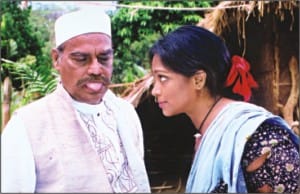“Doriya Parer Doulati”: Abdullah Al Mamun's upcoming feature film

Abdullah Al Mamun and Poppy in a scene from the film
After nearly eight years, veteran actor-director-scriptwriter and filmmaker Abdullah Al Mamun is all set to release his new feature film. The film, Doriya Parer Doulati, is likely to be released either on February 21 or March 26 this year.
The film features the relentless struggles of the community of labourers living in Hatia, who toil to build a barrage to save the island from tidal waves. Dirt-poor Doulati (Poppy) is beautiful and charming. She loves Boli (Manna) and wants to be with him. But her dream of a blissful romance is shattered when goons kill Boli. Hell hath no fury like an enraged woman and Doulati takes revenge by killing the murderers of her lover. Abdullah Al Mamun, Ferdousi Majumdar and Shahidul Alam Sachchu play the other central roles in the film.
“Right now, the film is awaiting clearance from the Censor Board,” informed Abdullah Al Mamun. The film is an adaptation of a novel by the late freedom fighter, Kamal Uddin Ahmed, better known as Bangla Kamal to the people of Hatia. Abdullah Al Mamun has written the screenplay. Ali Akbar Rupu and Arman Khan are the music directors of the film.
Mamun's last film Bihanga was released in 1999.
“The film was mostly shot in the island of Hatia as the story is based on the locale. The rest was done at Dhonbari in Tangail, Hotapara and also at FDC,” said Mamun.
The director also shared several interesting incidents that occurred during the making of the film. “Probably, we were the first team to shoot at the spot, which drew a massive crowd of nearly ten to twelve thousand people everyday. Out entire team had to work hard to prevent them from disrupting the shooting. We chalked out a plan that proved to be quite effective and the local people also turned out to be cooperative. Everyday before shooting, we drew a line around the spot and asked them not to cross it -- they agreed to our plan and method of working,” said a smiling Mamun.
“Communication is a major hurdle and we had to struggle everyday to go from one spot to another. Sometimes all we had to eat for days was dry fish. Another dreadful incident happened when one of the unit boys was almost stuck in the quick sand.
“The theme of the film is the turbulent lives of the labourers in a coastal area. I am quite optimistic that this film would receive the same kind of response Shareng Bou (1978) or Amjad Hossain's Golapi Ekhon Train-e (1978) was garnered with,” concluded Abdullah Al Mamun.

 For all latest news, follow The Daily Star's Google News channel.
For all latest news, follow The Daily Star's Google News channel. 



Comments